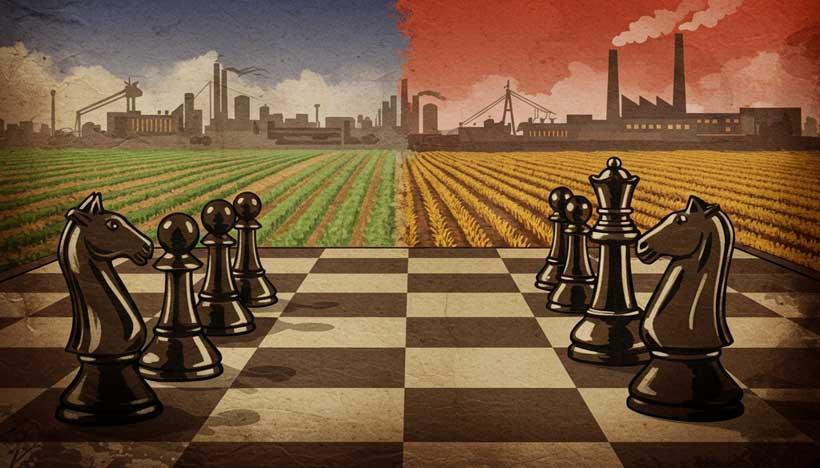By
Shiwen Yap
Africa-Press – Lesotho. In the new world order, tariffs have become a key battleground, particularly in the US-China strategic competition. As the global landscape fragments into interconnected regional blocs, nations are employing a range of economic weapons, including taxes on steel, import bans, and financial penalties designed to cripple a nation’s economy.
The increasingly interconnected world is witnessing a rise in trade policy conflicts, with sanctions, tariffs, and retaliation making headlines. The US-China trade dispute and penalties on Russia over its invasion of Ukraine are just a few examples. This raises a critical question: Are trade wars the new face of modern warfare?
Understanding Trade Wars: Economic Weapons in Action
Trade wars occur when countries use economic measures instead of military force to achieve their goals. One common tactic is the imposition of tariffs. These are taxes on imported goods that make them more expensive for consumers, encouraging them to buy local products.
A notable example is the US-China trade war launched in 2018. The US imposed tariffs on billions of dollars’ worth of Chinese goods, such as electronics and clothing, in response to what it deemed unfair trade practices. China retaliated with tariffs on American soybeans and cars, which had a significant impact on US farmers and manufacturers.
Sanctions are another economic tool used to influence a country’s behavior. They work like an economic blockade, cutting a country off from global trade and finance. For instance, the Russian annexation of Crimea in 2014 saw Western nations impose sanctions, freezing assets and banning trade in key sectors.
Russia’s response? It banned European food imports, resulting in economic losses for both sides. Retaliation is a common response to trade measures, where one country’s action prompts an equal or greater response from another.
Trade wars are not a new phenomenon and have a significant impact. The 19th-century Opium Wars between Britain and China were sparked by trade imbalances and Britain’s attempts to expand its opium trade. This demonstrates how economic motives can spur military conflict. Although modern trade wars rarely escalate into military action, they still profoundly impact economies and livelihoods.
Trade Wars vs. Military Warfare: A Different Kind of Fight
Initially, trade wars seem more benign compared to military wars. However, they are also about power and coercion, with nations seeking to exert economic pressure on each other. Instead of occupying territory, countries aim to restrict economic growth or protect their domestic industries.
US-China tariffs, for example, not only increased the price of TVs but also cost American consumers an estimated $42 billion annually, while Chinese exporters lost significant market share.
While military wars inflict immediate and devastating damage, trade wars are more insidious. Sanctions on Iran, intended to curb its nuclear ambitions, led to a 10% contraction in its economy between 2012 and 2018, according to the World Bank, resulting in widespread poverty. Although no lives were lost, the human suffering was real.
Trade wars have some advantages over military conflicts, as they avoid direct violence and can be calibrated to achieve specific goals. Tariffs can be lifted, and sanctions can be eased, allowing for a more nuanced approach.
However, they are not without risks. Trade wars can escalate tensions, as seen in the US-China trade dispute. Moreover, they often harm civilians the most, from American farmers losing soybean sales to Iranian families facing shortages of essential medicines.
Could trade wars replace military conflicts in some cases? Possibly. They are an instrument for nations to exert pressure without employing military force. However, history warns that trade wars can be a precursor to more severe conflicts.
In the 1930s, trade barriers exacerbated the Great Depression and ultimately contributed to the outbreak of World War II. While trade disputes rarely lead to full-scale wars today, they can amplify rivalries and create environments of tension and instability.
Do Trade Wars Work?
Nations launch trade wars with big goals: protect jobs, punish rivals, or force policy shifts. But are they effective? The evidence is mixed. The US-China tariffs aimed to bring manufacturing back home, but a 2021 Moody’s Analytics study found they created just 245,000 U.S. jobs while raising consumer costs—a modest win at best. China, meanwhile, pivoted to other markets, softening the blow.
Sanctions often fare worse. Take North Korea: decades of penalties haven’t inhibited its nuclear program, though they’ve shattered its economy. A 2019 UN report estimated 11 million North Koreans face food insecurity, partly due to sanctions. Pyongyang digs in while its people starve.
Russia’s sanctions saga since 2014 tells a similar tale. Moscow adapted by boosting local production, even as ordinary Russians saw experienced economic misery.
Then there’s the collateral damage. Trade wars ripple across borders. The US-China trade frictions saw global supply chains affected—car parts got pricier, tech firms scrambled, and consumers everywhere paid more.
Similarly, sanctions on Iran disrupted oil markets, inflating fuel prices worldwide. The World Trade Organization (WTO), meant to referee these disputes, stands powerless as major powers like the US bypass its rules.
Yet trade wars can score victories. South Africa’s apartheid regime buckled in the 1980s under global sanctions, hastening its end. The catch? Success often hinges on unity—when many nations join in, the pressure mounts. Solo efforts, like the US targeting Cuba for decades, tend to flounder and hurt more than heal.
The Bigger Picture: A Global Tug-of-War
In our interconnected world, trade wars tend to start locally, but their impact extends globally. Tariffs in Washington can spike grocery bills in Berlin. Sanctions on Russia rattled Europe’s energy markets, pushing up heating costs. The IMF warned in 2019 that the US-China trade war could shave $700 billion off global growth by 2020—money lost to higher prices and stalled trade.
They also reshape alliances. As China faced US tariffs, it forged economic links to Russia and Southeast Asia, building new trade ties. Sanctions on Huawei, the Chinese tech major, sparked a global scramble over 5G networks, blending economics with geopolitics. Trade wars don’t just move goods but also shape global power configurations.
For the average person, the stakes are tangible. That new phone costs more because of tariffs. Jobs vanish when exports tank. Inflation creeps up as supply chains snag. Trade wars may lack the drama of battlefield heroics, but their fallout hits wallets and dinner tables worldwide.
Are Trade Wars the New Warfare?
Are trade wars a dominant new form of modern warfare? It depends on the definition. If warfare means wielding power to bend others to your will, then yes—trade wars are a modern twist, fought with spreadsheets instead of swords.
They’ve surged in prominence, with the WTO reporting over 1000 new trade restrictions since 2008, dwarfing the handful of armed conflicts in the same span. Yet they’re not a full substitute for military might. Trade wars lack the visceral horror of Israeli military actions in the Gaza Strip. But they’re no less a weapon—less deadly, perhaps, but still divisive.
They’ve become the preferred go-to in the international relations playbook, a means to signal strength or settle scores with minimal bloodshed. The US didn’t invade China over trade imbalances; it hit them with tariffs. Russia didn’t bomb Europe over sanctions; it banned their apples.
Still, trade wars aren’t flawless instruments. They often yield collateral damage and hurt the innocent. They also risk backfiring in a globalized economy. And while they may de-escalate hot
Think of the US and China eyeing each other warily across the Pacific. Or how the US embargo on oil exports to Japan in the early 1940s triggered an attack on Pearl Harbor and the US entry into World War 2.
In the end, trade wars are less a replacement for military conflict than a new front in an old game. Nations have always battled for dominance, whether with armies or embargoes. Today, sanctions and tariffs are the preferred weapons, reshaping rivalries without breaking the peace. Yet.
As the world grows more tangled, the ongoing economic chess match between major powers like the US, Russia, China, India, Japan, Europe, and Southeast Asia—as well as the divergent Global South—will define our future, proving that in the art of war, the pen (and the tariff) can be as impactful as the bullet and the blade.
moderndiplomacy
For More News And Analysis About Lesotho Follow Africa-Press






